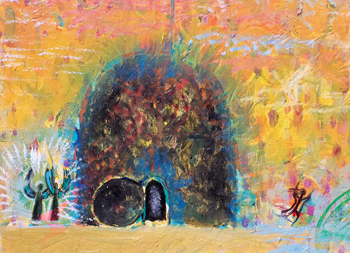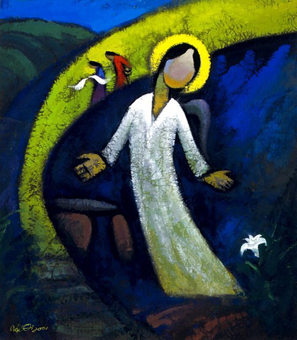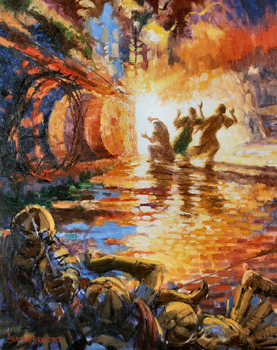For Sunday November 10, 2019
Lectionary Readings (Revised Common Lectionary, Year C)
Job 19:23-27a
Psalm 17:1-9
2 Thessalonians 2:1-5, 13-17
Luke 20:27-38
In this week’s Gospel reading, the Sadducees approach Jesus with a trick question. Hoping to pit him against his own religious tradition, they tell him a hypothetical story. A woman is given in marriage to one of seven brothers, they tell Jesus. When her husband dies without fathering an heir, she is passed on — as the law of Moses dictates — to his next younger brother. When that brother also dies without siring a child, she’s passed on to the third. And so on. Eventually all seven brothers die, and the woman — still childless — dies, too. “In the resurrection,” the Sadducees ask smugly, certain that they’ve ensnared Jesus, “whose wife will she be?”
The story is meant to be a joke that exposes the absurdity of believing in life after death. How could resurrection ever work in practical terms, given the complexities of human life? What would happen to marriage? To lineages and family traditions? To Old Testament law? To sex?
Jesus — as usual — refuses to take the bait. He tells the Sadducees that the entire premise of their question is wrong. Their conception of God is too small. The children of the resurrection, he tells them, will neither marry nor be given in marriage. They will be like angels — heavenly beings beloved of God, for whom the rules and practices of earthly life will not apply. To grasp resurrection via earthly terms is impossible; it is a reality of another order entirely, an order we can only approach by faith.
It’s tempting to dismiss this exchange as specific to first century Jewish culture, and irrelevant to us. After all, we don’t practice levirate marrage or debate the fine points of Mosaic law in our Sunday morning church services. Our intellectual assumptions and concerns are not the same as those of the Sadducees. And yet a few things about this story strike me as instructive for us 21st century Christians. Here they are in no particular order:
 |
Like the Sadducees, we have questions: If we assume we’re the first generation of sophisticated folks to find life after death implausible, we should think again. The resurrection has never made sense in human terms. The ancients struggled with it just as much as we do. They found it just as odd, just as unlikely, just as bizarre. In other words, there’s nothing new under the sun. The Sadducees in the Gospel story point out discrepancies between resurrection and the laws of marriage and kinship. Similarly, we point out discrepancies between resurrection and the laws of biology and physics. We find ourselves baffled by Easter morning. Try as we might, we don’t know how to wrap our brains around an empty grave, a reanimated body, a hope beyond the grim finality of death.
In a real sense, this is a relief. Our struggle is an old struggle; it has a storied history. We aren’t the first to wrestle with ultimate things, and we won’t be the last. Most importantly, Jesus understands. Note that his response to the Sadducees is not an angry one. He doesn’t scold; he challenges. He invites them to stretch themselves. To see anew, to see again. He asks them to think beyond entrenched categories of what’s possible and impossible, because nothing is impossible with God.
Privilege is a barrier: When I read the Gospels, I’m struck by how often the religious elite use the powerless and the marginalized to score points against Jesus. A mob of self-righteous men drag a terrified woman “caught in adultery” to Jesus, and dare him to let her off the hook in violation of Old Testament law. Elite dinner guests berate a brokenhearted woman who anoints Jesus’s feet with her tears. The Pharisees criticize Jesus for eating with tax collectors and “sinners.” In this week’s reading, the Sadducees concoct a story about a vulnerable widow who is passed from one man to another like human chattel, just to trip up Jesus. In each of these examples, the person in pain is expendable. In each example, human suffering is abstracted for the sake of argument, debate, and theological comeuppance.
 |
No wonder the marginalized flock to Jesus while the privileged find him intolerable. Resurrection means living in circumstances that should render living impossible. Resurrection means enduring, overcoming, persisting, and surviving. What does the privileged know of such robust and resilient living? Maybe resurrection only makes sense to those who desperately need it. Maybe the hope of justice, peace, rest, and consolation after death only resonates for those whose lives on earth are marred by injustice, anxiety, toil, and trauma.
The children of resurrection know that questions about Jesus are not finally academic questions. They are questions of life and death. They are questions with stakes so high, so consequential, and so profound, we dare not abstract them. Imagine what resurrection would feel like for the woman trapped in the Sadducees’ story. Imagine her arriving — finally, finally — in a place where her worth and her belovedness don’t depend on her husband, or her fertility, or her sex appeal. Imagine her basking in the safe, unconditional, and eternal love of the God who created her.
If our questions and objections about faith require us to invalidate the lived experiences of actual people who are suffering in this life, then we are asking the wrong questions and favoring the wrong objections. The children of resurrection are children of love. Period.
We’ll know it if we walk it: the other problem with approaching Jesus as the Sadducees do is that their approach isn’t intimate and personal. They want to know Jesus without walking with Jesus. They want to witness resurrection without suffering death. Throughout the Gospels, Jesus makes clear that only those willing to take up their own crosses and follow him can experience new life. Only disciples will become children of the resurrection, “worthy of a place in that age.” The life of faith is not a spectator sport — to know it, we have to walk it. We have to risk intimacy with Jesus. We have to share in his life as it is incarnated within Christian community. We have to take up the practices of God’s people. We have to enter into the joy, the loss, the sacrifice, the wonder, the mystery, the grief, and the challenge of life in Christ. Resurrection knowing is a lived knowing.
 |
Do we want this kingdom or don’t we? In his response to the Sadducees, Jesus describes a realm in which people neither marry nor are given in marriage. A realm where no human being “belongs” to any other, because all belong equally to God. This is (we can safely extrapolate) a realm where women are no longer treated like property. A realm where sex, sexuality, power, status, gender, marriage, kinship, and childbearing no longer bind or restrict God’s children. A realm where patriarchy is obsolete, defunct, and dead.
The realm Jesus describes is the kingdom of God. It is the very kingdom we supposedly invite into our daily lives each time we pray the Lord’s Prayer: “Your kingdom come, your will be done, on earth as it is in heaven.” If this is the case, why do so many Christians continue to support discrimination against women, against the LGBTQ community, and against a myriad of other oppressed minority groups — two thousand years after Jesus described a realm of radical freedom, radical love, and radical equality? Why does any iteration of the Church continue to support patriarchy and its anxiety-ridden views on sex, gender, race, and sexuality? Jesus’s description of the kingdom of God is clear. Do we want God’s kingdom, or don’t we?
God is not a God of the dead: This is the line Jesus uses to conclude his response to the Sadducees. “Now he is God not of the dead, but of the living, for to him all of them are alive.” We serve the God of the living. What does this mean? Perhaps it means that God is always in the business of making new, and making alive, and making vibrant. Perhaps it means we need to stop clinging to what is dead, to what is deadening, to what is passing away. Perhaps it means we need to risk evolution, metanoia, growth, and change. What new and living thing does God want to do among us that we’re too afraid to let God do? Where are we stagnating? Can we rise up out of our graves? Can we hold out for the impossible? Can we dare to live as Jesus longs for us to live? As the children of resurrection?
Debie Thomas: debie.thomas1@gmail.com
Image credits: (1) Fine Art America; (2) The Catholic Spirit; and (3) Fine Art America.





